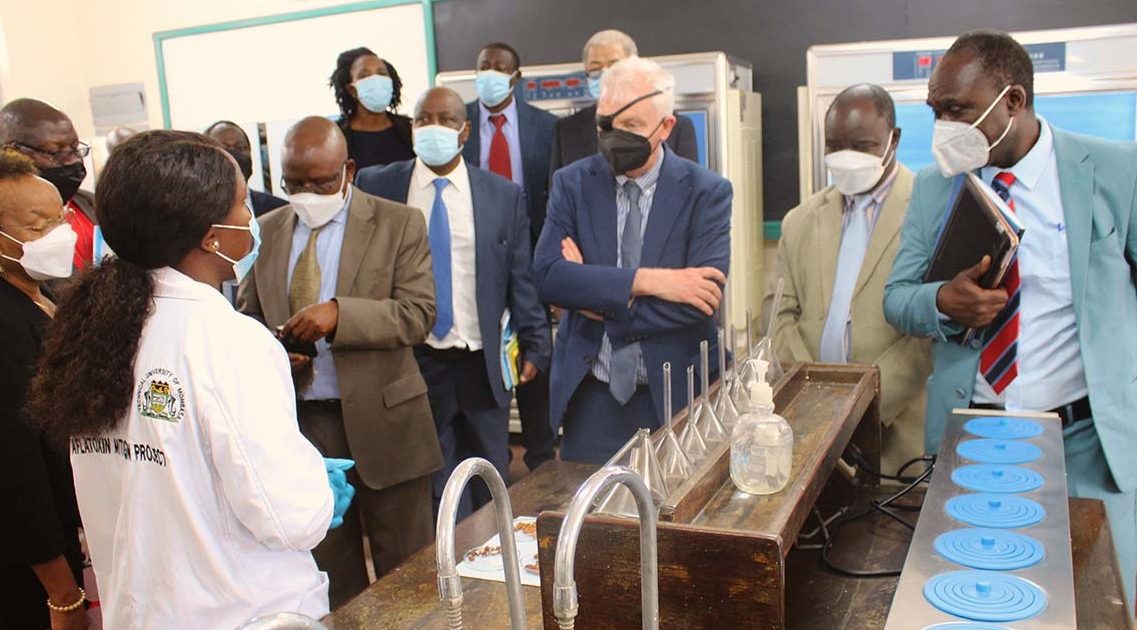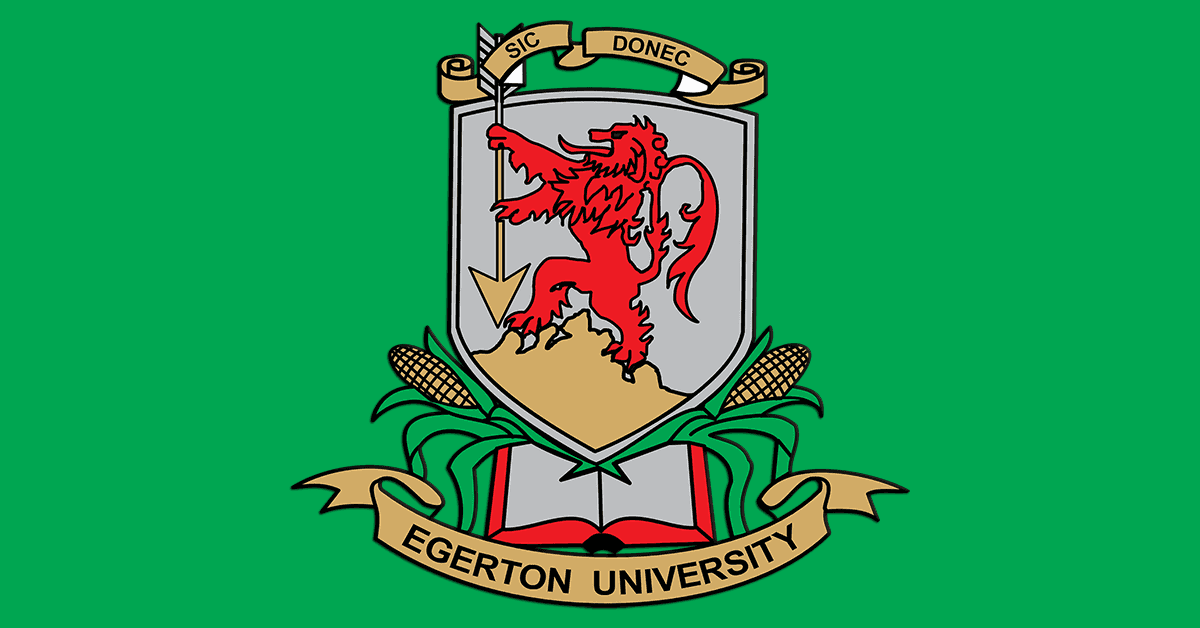
ICGEB Establishes Regional Research Centre In Kenya
- By Anne Mwale and Elizabeth Simiyu
Kenya has been selected by the International Centre for Genetic Engineering and Biotechnology (ICGEB) Board of Governors to host its first Regional Research Centre (RRC) in Africa, to complement the one in China.
The board which runs 46 state-of-the-art laboratories, in Trieste, Italy, New Delhi, India and Cape Town, South Africa has also approved the appointment of National Commission for Science, Technology and Innovation (NACOSTI) Director General Professor Walter Oyawa as ICGEB Governor for Kenya.
According to Professor Oyawa, the ICGEB Regional Research Centre that will be based at Egerton University’s main campus in Njoro Sub-County, the second such outfit in the world after the one in China, will specialize in food safety, molecular plant breeding, molecular plant pathology and entomology, genetic biofortification, development of molecular diagnostic tools and their applications and bioprospecting for biopesticides and bioactive compounds.
“During the 22nd session of the ICGEB Board of Governors held in Cape Town in 2016, it was decided to explore possibilities of setting up ICGEB- RRC in Africa. Subsequently, during the Annual General Meeting in December 2020, ICGEB Board resolved that Kenya was to host the RRC within its territory. I was tasked to identify the institution to host the RRC” the Director-General NACOSTI noted.
In an interview at the institution’s Njoro Main Campus the Director General said seven universities in Kenya had applied to host the Research Centre and thereafter three were shortlisted for further on-site inspection culminating in the selection of Egerton University.
Professor Oyawa affirms that since biotechnology development remains a top priority in enhancing food security, evolving more efficient and cleaner industrial manufacturing processes, and reducing negative effects on the environment in Kenya, establishment of the Regional Research Centre in the country comes at an opportune time.
He elaborates, “Evidence shows biotechnology has aided so far in increasing food production as scientists aim at making it beneficial too to the environment. Biotechnology might simply be the solution to Kenya’s future and current agricultural problems like adverse climate and weather changes, feeding an ever growing population and converting the huge bare chunks of land to be arable.
Kenya he noted, has a great potential to grow crops bio technically like Africa’s top countries namely South Africa, Egypt and Burkina Faso adding that development of herbicide tolerant crops for instance would save farmers the many hours spent on the farm getting rid of weeds thus invest them on other productive agricultural activities that will help promote food security.
“Various studies show biotechnology in Kenya can be improvised to help farmers even diagnose crop diseases by incorporating mobile technology,” offers the NACOSTI Director General.
The ICGEB is an intergovernmental and nonprofit research organization. Established on November 25, 1987 as a special project of the United Nations Industrial Development Organization (Unido), it became fully autonomous in 1994 and now incorporates over 65 Member States. A further 22 countries are waiting to become members pending ratification by the Council of Governors.
Professor Oyawa explains that the ICGEB dedicates its resources to advanced research and training in vaccine development, molecular biology and biotechnology and advancing knowledge, applying the latest techniques in the fields of biomedicine, crop improvement, environmental protection/remediation, biopharmaceuticals, biopesticides and biofuel production.
ICGEB which also strengthens the research capability of its members through training and funding programmes and advisory services, also promotes research themes associated with infectious diseases, non-communicable diseases and industrial biotechnology.
Prior to the selection of Egerton University as the first ICGEB –RRC in Africa, a review panel comprising of scientists from the USA, Italy, India and South Africa, and experts from other Kenyan institutes led by Dr Lawrence Banks and Professor Oyawa , had visited the institution on February 3, this year for on-site inspection.
“The inspection team was impressed by the commitment demonstrated by the University Management, synergies between faculty members, and clear understanding and coherence of the RRC concept by the proposed Project Team. Subsequently the ICGEB Board of Governors during its 28th Session held on 17-18 May, 2022 in Trieste Italy, finally endorsed the Kenya’s proposal to host the center,” Professor Oyawa added.
Egerton University Acting Deputy Vice Chancellor in charge of Research and Extension Professor Bockline Bebe indicated that the centre will be instrumental in strengthening research skills, knowledge and capacities of the scientific community while pursuing specific objectives for research, training, and technology transfer to industry.
“This is a landmark achievement by Kenya as a global powerhouse in science, technology and innovation. The ICGEB -RRC will be collaborating with institutions from the member countries in the region in scientific research and mentoring the smaller universities in Kenya. Hosting the ICGEB -RRC brings additional advantages, including promoting development and job creation beyond the hosting country, Kenya,” the Deputy Vice Chancellor stated.
As an institution involved in research and academic work in the areas of disease biology, vaccine development, diagnostic and therapeutic, Professor Bebe said that the Centre will strive to make its contributions in promoting international collaborative efforts to develop technologies to improve human health globally.
The Deputy Vice Chancellor assured that the new ICGEB- RRC in Africa will operate as a Centre of Excellence for research, training and technology transfer to industry to promote sustainable global development. It will provide a scientific environment of top international standard for advanced research and education and for the development of biotechnology products.
After Egerton University made a bid to host an ICGEB RRC in Kenya in February 2021, Professor Bebe, appointed a technical team to develop a proposal in response to the submission, which was submitted to NACOSTI in March 2021. The technical team consisted of Professor Josiah Omollo who assumed the role of Institutional Principal Investigator, Professor James Owuoche and Professor Liu Gaoxiong.
Others in the team included Dr Miriam Charimbu, Dr John Nduko, Dr Joseph Mafurah, Dr Pascal Okwiri, Dr Elijah Lelmen, Dr Kiplagat Ngeno, Dr Joel Khobondo and Dr Stephen Indieka.
Presently more than 400 individuals drawn from 38 countries are working in the ICGEB laboratories as research scientists, post-doctoral fellows, PhD students, research technicians and administrative personnel.
SOURCE: Kenya News Agency







